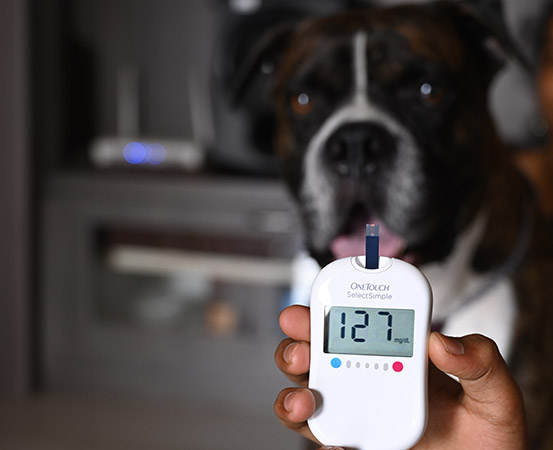
Returning home after a long day at work, to a cute dog who wags its tail happily seeing you can possibly take away all your stress. But if you are unable to spend enough time with them and take them out for walks or exercises or ensure a proper diet for them, they too can develop stress and chronic conditions like obesity and diabetes.
Diabetes not only affects humans but pets too. Dogs can also develop imbalance in their blood sugar levels. It is a common disorder where their body is unable to utilize glucose. The glucose level in the blood is managed by insulin, secreted by pancreas. So, beware of falling for their cute little puppy face and deciding to cut short on their walks. Many also offer them chocolates or sweets as treats, which are harmful and toxic for them, say veterinarians.
What causes diabetes in dogs
A dog is considered diabetic if the fasting blood sugar level is more than 120 mg/dL. Experts say there are many factors that can lead to the development of diabetes in dogs. Dr Pawan Kumar, founder and veterinarian at Cessna Lifeline Veterinary Hospital, Bangalore, says, “They are obesity, stress and chronic pancreatic disease. Pancreatic disease is the most common cause of diabetes in them as they cause fluctuations in the sugar levels. They (diabetic dogs) mostly develop insulin dependent diabetes, which cannot be treated orally with tablets like in humans.”
Side effects of some medications like steroids can also sometimes cause diabetes. Dr MV Jithin, Assistant Professor, Department of Veterinary Clinical Complex, College of Veterinary and Animal Sciences, Sardar Vallabhbhai Patel University of Agriculture and Technology, Meerut, says, “It can affect the adrenal glands, causing hormonal imbalance. Also, they can develop diabetes due to tumor in the adrenal glands or if the glands do not develop well during the course of time.”
He shares that cases of diabetes are observed more usually in metropolitan cities as the owners try to adjust their lifestyles as per their convenience. “Lifestyle changes like physical inactiveness can cause gross disturbances in the body of an animal,” he says.
Can puppies have diabetes?
Dogs can develop diabetes at any age. More commonly, the condition is observed in adulthood, say experts. There are two types of diabetes in dogs – juvenile or primary or insulin-deficiency diabetes (equivalent to Type 1 diabetes in humans), which is caused due to pancreatic issues, and non-juvenile or secondary or insulin-resistance diabetes (equivalent to Type 2 diabetes in humans), common in older dogs with obesity.
Signs of diabetes in dogs
The early symptoms of diabetes in pets are also similar to that of humans. They also develop polyphagia (excessive hunger), polydipsia (excessive thirst) and polyuria (excessive urination). A tremendous loss of weight can also indicate diabetes.
Experts say any breed can develop the condition, but they observe more cases in Labradors, probably also because they are more in number. Dr Kumar says any breed can develop diabetes. According to him, genetics can also play a role. “If a dog has diabetes, it is very likely that its progeny will also develop the condition,” he says. However, the role of genes needs to be studied further to understand the association, says Dr Jithin.
Side-effects of diabetes in dogs
Early diagnosis is important to help reduce the complications of diabetes. Dr Kumar says, “Juvenile dogs (6 months to 1 year of age) can develop cataract, urinary tract infections and neurological disorders, affecting their hind limbs.”
A pet can also develop kidney failure, retinopathy, delayed wound healing and ketoacidosis if not diagnosed at the right time. Dr Jithin says unlike in humans where ketoacidosis is a complication of low sugar, in dogs, they can occur when sugar levels are high. “In pets, glucose levels are mostly high, and they don’t get converted to energy, leading to production of ketones. It is harmful to the body,” he says.
How to treat diabetes in dogs
In dogs, diabetes is treated with insulin therapy in the form of injections, not orally. The challenge, say veterinarians, is to find the right dose of insulin for the pet. Dr Kumar says they are sometimes hospitalized so that the treatment can be standardized. “There are short-acting and long-acting insulin injections which need to be administered every day, once or sometimes, even thrice a day,” he adds.
Dr Jithin says theoretically, insulin dose is said to be 0.5 to 1 unit per kg weight of the animal but that might not be enough. “We advise having a similar glucose monitoring set up in place at home. The owner should check blood glucose levels of their pet every two hours by pricking on an area where the blood can be pulled. Usually, we say ear tip,” he adds.
Can dogs recover from diabetes?
Usually, endocrine disorders are said to only be managed. But if diabetes is caused due to pancreatitis and if it’s treated on time properly, the condition might get cured, says Dr Kumar.
The recovery also depends on the diagnosis and the type of diabetes. Experts advise owners to regularly monitor the blood glucose levels and follow the instructions of the doctor patiently.
Dr Jithin adds it is best to avoid giving chocolates and sweets to the pets. “They are contraindicative. Dogs are carnivores but we have got them adjusted to our lifestyle. Giving them sweets once a while is fine but do not make it a habit,” he says.
Preventing diabetes in dogs
Early detection is the key for diabetes management. Dr Kumar says dogs can’t tell symptoms and so, it can easily get missed. “So, a regular checkup with the veterinarian once every three to six months is necessary. Also, spending quality time with them, playing and getting them to do exercises to prevent obesity and stress can help,” he recommends. Once diagnosed, the owners should ensure diabetic diet which is low in fat and carbs for their pooch. “There are commercially available diabetic diets, with quality proteins and omega fatty acids, specifically meant for them,” he says.
Takeaway
- Pancreatic diseases are the most common cause of diabetes in dogs. They could also develop the condition due to obesity, stress and unwanted administration of medicines like steroids.
- Though the condition is more common in adulthood, dogs can develop it at any age.
- They are treated with insulin therapy.
- Regular checkups, a proper lifestyle with a good amount of exercises, and reducing stress can help prevent the condition in dogs.
- The condition can only be managed by regularly monitoring the glucose levels, adjusting insulin dosage accordingly and following a diabetic diet.

















